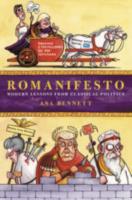
Biteback (2019) h/b 285pp £12 (ISBN 9781785905193)
All classicists (whatever their political preferences) must feel encouraged by the recent attempts by some political spokesmen (notably Boris Johnson and Jacob Rees Mogg) to reintroduce references to the language and literature of the classical word. This book is a relatively light hearted attempt to give some justification to this apparent affectation or indulgence. B.’s first degree was in Classics at UCL and he is currently working as a journalist—Brexit commissioning editor at the Daily Telegraph.
His thesis is that the practice of politics has changed little since the classical period and that modern politicians might learn much from a study of the activities of their Roman counterparts. Jonathan Powell suggested something similar in his comparison of the Blair years with Machiavelli.
The format of the book is to take an aspect of politics and to compare and contrast similar examples of that aspect from each period. Thus he covers, for example, getting started in politics, networking, spin doctoring, image building, coups, leaving a legacy, fake news and several more. In some cases he leads with a modern example which he contrasts with a classical incident, in others vice versa. Most of his classical examples are Roman and drawn from the late republic and early Empire, while most of his modern examples are from the last 20 years. So Cato, Cicero and Caesar loom large as do Blair, Trump and Johnson. Although well researched and apposite the examples are reported without too much critical analysis about their accuracy—whether the loucher anecdotes of Suetonius and Polybius or the exaggerations of the modern tabloids. B. does however seek to unpick the fake news surrounding Nero in order to illustrate how reputations can be manipulated by the media.
Some similarities are intriguing—Tiberius is compared both with Berlusconi (Capri orgies and bunga bunga parties) and with Theresa May (lack of transparency). Some are more obvious—the walls of Hadrian and Trump. Some are illuminating—disorganisation within the plotters against Caesar and Theresa May. B. interestingly compares the influence of haruspexy with that of opinion polls and declares that Julius Caesar launched the first political blog, swiftly imitated by Augustus.
The title Romanifesto is perhaps rather an indulgence—the emperors did not need to publish manifestos, merely biased accounts of what they claimed to have achieved. Perhaps only the Gracchi delivered anything like a manifesto in the classical period, but B. uses their story mainly in his comparison of reactions to populism.
This is a very enjoyable jeu d’esprit, but with a serious import which would reward a more considered examination by both classical scholars and modern political gurus, both of which groups would gain useful insights for their own disciplines. For any generalist Classics for All member this is a ‘must read’.
Roger Barnes
